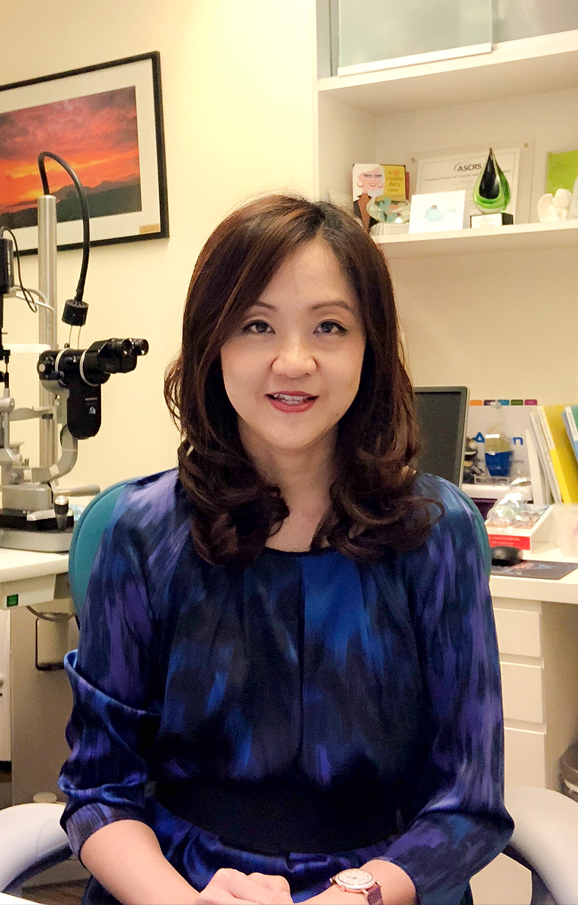Cataract Surgery in Singapore

Cataract in Singapore
In Singapore, cataract affects around 80% of people aged 60 and above!
A very common eye condition that worsens over time, it is crucial to know what to look out for and get treated before severe vision loss occurs.
What is a Cataract?
A cataract is a loss of transparency or clouding of the lens of the eye. The normal lens is crystal clear. As one ages, however, chemical changes occur in the lens that make it less transparent, thereby obstructing the passage of light through the lens and affecting one’s clarity of vision.
Cataracts are not all the same and may be mild, moderate or severe.

What are the Symptoms of Cataract?
- A progressive and painless blurring of vision
- Glares, particularly at night or in dim settings
- A need for frequent spectacle prescription change
- A change in colour perception
- Doubling of image in the affected eye (less common)
Be careful! Sometimes, cataracts may cause an improvement in one’s near vision (thus reducing one’s reliance on reading glasses), giving a false impression that one’s vision is improving.
If you notice yourself or a loved one experiencing the above symptoms, visit an ophthalmologist for a detailed cataract assessment today.
What Cataract Treatments Should I Consider?
Not all cases of cataract require cataract surgery. If the visual blurring is still mild, surgery is usually not required yet. However, if the blurring is significant enough to affect your daily activities, then cataract removal surgery in Singapore will be recommended. Contrary to popular belief, you should not wait until the cataract is too dense, mature or opaque before undergoing surgery, as complications are more likely to occur. Recovery from complicated cataract removal surgery often takes a longer time as well.
Types of Cataract Removal Surgery in Singapore
Cataract removal surgery is a very safe, successful and life-changing operation as the old cloudy lens is replaced with a new and clear one. There are 3 types of cataract surgery and your Singapore cataract surgeon will discuss your options and make the most appropriate recommendation for you.
Phacoemulsification (Phaco)
A small incision in the eye is first made (using a blade through a small wound) and a special device using high-frequency ultrasound energy is used to soften and break down the cataract for easier removal.
Femtosecond Laser-assisted Cataract Surgery (FLACS)
Most notably, no blades are used in this method. Popularly known as the bladeless cataract surgery in Singapore, a highly precise femtosecond laser is used to create the wound and facilitate the removal of the cataract. The cataract specialist then removes the cloudy lens via ultrasound.
Extracapsular Cataract Surgery (ECCE)
This is the older, traditional method whereby a larger wound is made in the eye that requires suturing in the end. This means that recovery time is longer. This is no longer routinely offered in most cases, but some very dense and complicated cataracts may have to be removed this way.
With current advancements in cataract surgery, recovery from a routine surgery is often quick and painless with success rates of 95% and above.
Intraocular Lenses (IOLs): Essential for Every Cataract Surgery
An intraocular lens (IOL) is the new, clear, artificial lens that is placed in the eye after the old cloudy one has been removed. Basically, it mimics the focusing power of the eye’s natural lens that allows us to see.
The 2 main types of IOLs are:
Monofocal IOLs
Correcting distance vision, they are great for clear far vision, but glasses will still be required for reading and other near work.
Multifocal IOLs
Correcting a range of vision, they come in bifocal, trifocal and extended range versions which can allow for clear vision at various distances.
Our Singapore
Cataract Surgeon

Meet Your Cataract Surgeon
Dr Cordelia Chan
Consultant Ophthalmologist
MBBS (S’pore), FRCS (Edinburgh), MMed (S’pore), FAMS (Ophth)
Dr Cordelia Chan is a highly experienced ophthalmologist and cataract surgeon, having devoted close to 30 years of her career to the specialty. The former Head of the Refractive Surgery Service at the Singapore National Eye Centre and cataract surgery teacher and mentor of many of the current ophthalmologists practising in Singapore and internationally, Dr Chan is no doubt well-recognized in her craft
